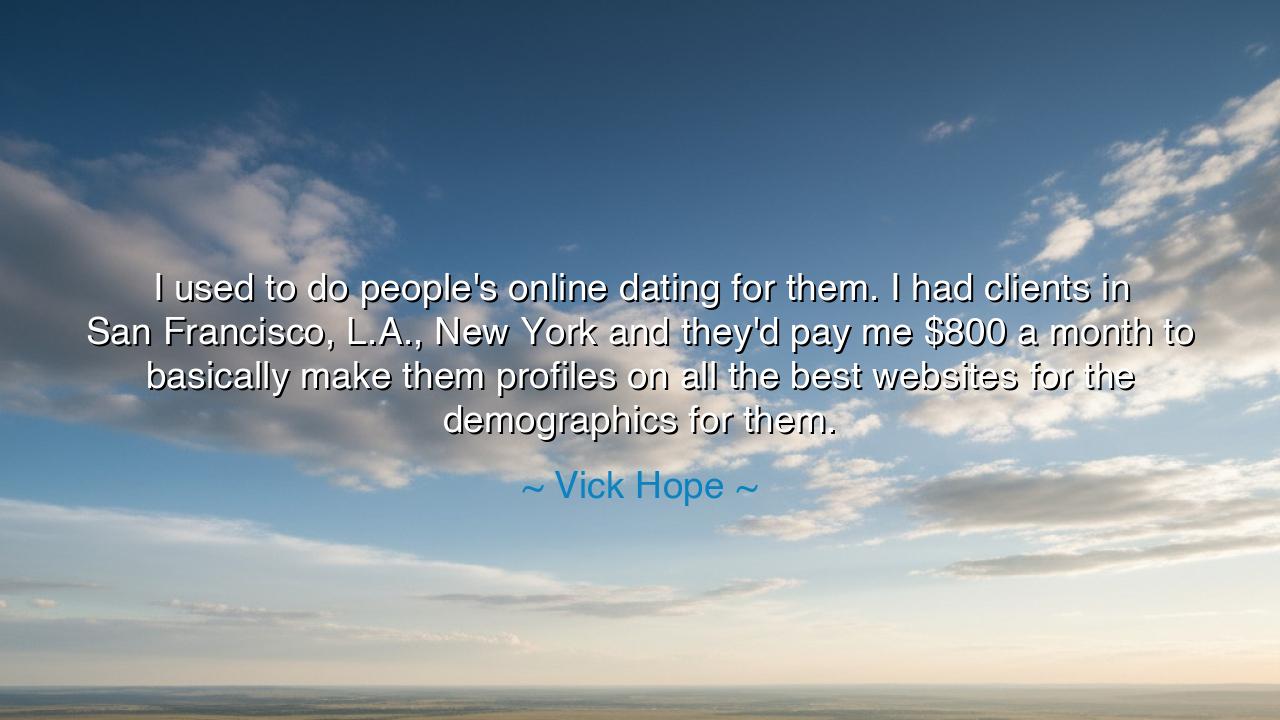
I used to do people's online dating for them. I had clients in
I used to do people's online dating for them. I had clients in San Francisco, L.A., New York and they'd pay me $800 a month to basically make them profiles on all the best websites for the demographics for them.






The eloquent and insightful Vick Hope, reflecting on the strange rituals of modern love, once said: “I used to do people’s online dating for them. I had clients in San Francisco, L.A., New York and they’d pay me $800 a month to basically make them profiles on all the best websites for the demographics for them.” At first, this may sound like a confession from the digital age — a story of clever entrepreneurship in the world of romance. Yet beneath her words lies something deeper, something profoundly revealing about the human longing for connection and the growing distance between who we are and how we present ourselves to the world.
In this quote, Vick Hope unveils a modern paradox. Technology has made it easier than ever to meet others — and yet, people have never felt more uncertain about how to truly be seen. Her clients were not merely paying for words on a screen; they were paying for representation, for the hope that someone else might express what they themselves could not. Behind the polished photos and crafted bios was a quiet truth: that love, though eternal in its essence, has been reshaped by the demands of modern life — by image, algorithm, and the fear of being unseen.
The ancients, though they lived in a world without screens, understood this same hunger for recognition. The poet Ovid, in his Ars Amatoria (“The Art of Love”), taught the Romans how to present themselves in the best light — how to dress, speak, and charm. His lessons were not unlike Vick Hope’s, for both sought to bridge the gap between desire and expression. But where Ovid’s lovers wrote letters by candlelight, Hope’s clients sought guidance through pixels and code. The methods changed, but the yearning remained — the timeless hope that another might look upon us and see something worth loving.
Her story is also a reflection of the loneliness of abundance — the condition of a society that has infinite options but diminishing depth. In San Francisco, Los Angeles, New York — cities filled with ambition and brilliance — people who had everything still felt the need to hire someone to curate their hearts. They outsourced authenticity because they feared rejection, because vulnerability had become too risky, too inefficient. And in doing so, they revealed the quiet wound of our times: that love, which once grew from conversation and courage, has become something we try to engineer.
Yet, there is tenderness in Hope’s insight, too. Her tone is not judgmental but understanding. She knows that people turn to technology not because they are shallow, but because they are afraid — afraid of failure, of time, of being misunderstood. In a world where identities are built in fragments, she offered what many could not give themselves: coherence. For a moment, she gave her clients a voice — a chance to be noticed in the noise. Her work, though born of modern necessity, reveals the enduring truth that human connection is not found through perfection, but through honesty.
Consider, too, the story of Cyrano de Bergerac, the 17th-century poet and swordsman who wrote love letters on behalf of another man, expressing feelings that were not his own. Cyrano’s eloquence won the heart of the woman he adored — yet she never knew that the words came from him. His story, like Hope’s clients, reminds us that when love is filtered through another’s hand, even the truest emotions can lose their way. The lesson of Cyrano — and of Vick Hope’s observation — is that while others may help us find our voice, only authenticity can sustain love once it begins.
So, my listener, take this teaching as both caution and comfort. In an age where everything can be optimized — even affection — remember that the truest form of love cannot be outsourced. Do not fear showing who you are, even if your words tremble and your photos are imperfect. Seek connection not through strategy, but through sincerity. Vick Hope’s reflection is a mirror for our time: it reminds us that while technology may change the form of love, the heart of it remains ancient — vulnerable, searching, and radiant in its desire to be known. And when you find yourself tempted to hide behind a polished image, remember this: love, in every age, begins not when you are perfect, but when you are real.






AAdministratorAdministrator
Welcome, honored guests. Please leave a comment, we will respond soon